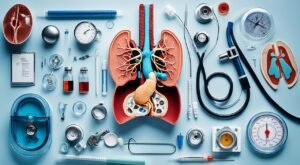Digestive health is an integral component of overall wellness, and several habits can help optimize it. Hydration is especially crucial; drinking plenty of water and other fluids helps ensure a functioning digestive system and prevent issues like constipation. A balanced diet rich in fiber also plays an essential role.
Attaining optimal digestive health means including plenty of fruits, vegetables, whole grains, and legumes into meals. Exercise is another crucial aspect for optimal digestive health as physical activity helps stimulate digestion while avoiding issues like bloating and constipation. Finally, managing stress levels is also key for optimal digestive wellbeing.
High stress levels can have an adverse impact on our digestive systems, so adding meditation or yoga into daily life as ways of relieving tension may help our digestion remain at optimal health and improve overall wellness.
1. Drink Lots Of Water

Staying hydrated is key for optimal digestive health. Water helps the digestive system function optimally by aiding with food breakdown and absorption as well as constipation prevention by keeping stools soft and easy to pass. A lack of water can cause dehydration which leads to constipation, bloating and other digestive issues; for optimal digestive wellbeing it is advised that at least eight glasses of water per day be consumed.
Avoid drinking too much alcohol, sugary drinks and caffeinated beverages which can all contribute to dehydration. Instead opt for water and other hydrating fluids like herbal tea or coconut water as these are best at maintaining digestive system health and functioning optimally. Making water consumption part of your daily routine will support optimal function of the digestive tract and contribute towards its maintenance.
2. Eat A High Fiber Diet

Consuming a diet rich in fiber is one of the key habits for maintaining optimal digestive health. Although our bodies cannot digest fiber directly, it plays a critical role in healthy digestion by passing relatively intact through our digestive systems, adding bulk and regularity. Fiber also acts as a prebiotic, feeding beneficial microorganisms in our gut and maintaining balance with microbes in your environment.
Studies have demonstrated the power of fiber-rich diets to lower the risk of digestive disorders like constipation, diverticulitis and colon cancer. To increase fiber intake in your diet, focus on including fruits, vegetables, whole grains, nuts and seeds – aim for 25-30 grams daily for optimal digestive health!
3. Never Skip Meals

Maintaining optimal digestive health is integral to overall wellbeing, and one of the easiest and most effective strategies to achieving it is never skipping meals. Skipping meals can lead to overeating or irregular eating patterns which lead to digestive issues like acid reflux, constipation, or bloating; eating regular meals helps regulate digestive system functioning for improved nutrient absorption and an overall healthier gut environment.
Maintaining a healthy weight is also key for digestive health, so making eating regular and balanced meals a habit will ensure optimal digestive health. Skipping meals may lead to slower metabolisms which makes losing or maintaining a healthy weight more challenging; thus it is vital that we establish this practice to maintain good digestive health.
4. Avoid High Fat Foods

Maintaining optimal digestive health is vital for overall wellbeing, and one way to do that is to limit consumption of high-fat foods that may be difficult for the body to process and cause discomfort, bloating, or other digestive issues. For optimal digestion it is wiser to opt for fiber-rich fruits and vegetables which are easier to digest – eating smaller meals more frequently may also help.
Staying hydrated by drinking enough water can help flush toxins out of the body and prevent constipation, while developing healthy eating habits and making conscious food choices can go far towards supporting optimal digestive health. In conclusion, cutting back on high-fat foods while including more fiber-rich food like fruits and vegetables in one’s diet will contribute to maintaining optimal digestive health.
5. Live An Active Lifestyle

Engaging in physical activity is proven to have significant positive results on digestive health. Exercise helps increase blood flow and oxygen intake, which in turn enhances digestion and nutrient absorption. Furthermore, regular physical activity may help avoid constipation as well as decrease your risk for developing GI disorders.
Meditation or yoga, two stress-reducing practices, can also help improve digestive health. Stress disrupts your system, leading to bloating, gas, and constipation – so by relieving tension you can promote an efficient digestive system as well as overall well-being.
Overall, living an active and adopting healthy habits can have a dramatic impact on your digestive health. By including physical activity, healthy diet habits, and stress reduction techniques into your daily routine, you can promote optimal digestion function while improving quality of life overall.
6. Say Yes To Probiotics

Probiotics are living microorganisms found in our gut that play an integral part in maintaining optimal digestive health. Probiotics help break down food and absorb nutrients, as well as control harmful bacteria. Integrating probiotics into daily routine can improve digestion, reduce inflammation, increase immunity, and even promote mental well-being.
Probiotics are available through fermented foods like yogurt, kimchi, sauerkraut and kefir as well as probiotic supplements widely available on the market; it is also important to select high-quality supplements with various strains of probiotics.
Probiotics are just one way of supporting digestive health; other healthy habits, like staying hydrated, eating fiber-rich foods and reducing stress are also beneficial in doing so. By choosing probiotics and adopting healthy practices you can support both your gut health and overall well-being.
7. Say No To Stress Eating And Caffeine

Stress eating and caffeine habits can wreak havoc on your digestive health. Stressed bodies release cortisol, which causes inflammation in the gut and hinders digestion. Furthermore, caffeine can trigger acid reflux and cause stomach lining irritation; over time these behaviors could lead to more serious digestive conditions like irritable bowel syndrome (IBS) or gastroesophageal reflux disease (GERD).
To avoid these issues, it’s essential to find alternative methods of managing stress such as yoga or meditation and restrict caffeine consumption. Furthermore, eating foods rich in fiber and probiotics will support a healthy gut microbiome while improving digestive health overall. By refraining from stress eating and caffeine consumption habits you can help optimize digestive health while preventing long-term damage to your gut.
8. Enhance Your Food Menu

Enhancing your food menu is vital to optimal digestive health. Our diet has an immediate effect on our GI system and therefore it is crucial that we pay close attention to the type and amount of foods we eat each day, especially ones rich in fiber such as whole grains, fruits and vegetables that may help facilitate normal bowel movements and promote regularity in digestion.
Consuming probiotic-rich foods, like yogurt and kefir, can support the growth of beneficial bacteria in our gut and aid digestion. Staying hydrated by drinking sufficient water while cutting back on caffeine and alcohol consumption is also vitally important.
Adopting healthier food habits, such as cutting back on processed and high-fat foods, can also play a key role in supporting optimal digestive health. By adopting these healthier habits into your meal plans, you could increase the overall benefits of optimal digestive wellness for yourself and those you care for.
9. Quit Your Bad Habits

Maintaining good digestive health is integral to overall well-being, but some bad habits can negatively affect it. Breaking these bad habits and adopting better practices are essential if you want to reach optimal digestive health. Eating too quickly, for instance, may cause indigestion and bloating; take your time chewing your food thoroughly so you can savor each bite instead!
Consuming high-fat and processed foods on a regular basis can cause inflammation of the digestive tract, leading to discomfort and digestive issues. Switching up your diet by including more whole, unprocessed foods is one way of combatting these problems. Incorporating more whole, unprocessed foods will also help. Furthermore, excessive alcohol consumption is another known contributor of inflammation within the system – cutting back or even completely refraining can improve digestive health significantly.
Smoking can lead to many digestive health problems, including acid reflux, ulcers and colon cancer. Quitting smoking is an integral component of overall wellness and can improve digestive function; by breaking bad habits you can achieve optimal digestive
10. Master The Art Of Chewing
Chewing is an overlooked but essential component of daily life that plays an integral part in maintaining digestive health. By mastering the art of chewing, we can improve overall digestive function and decrease our risk for issues like bloating, constipation and acid reflux. Chewing allows our bodies to more easily absorb nutrients and eliminate waste products through digestion.
Furthermore, chewing releases digestive enzymes into our saliva that aid digestion of our food and improve overall well-being. By taking time and care when chewing our meals we can maximize digestive health and improve overall wellbeing.
Conclusion
Digestion health is integral to overall wellbeing. You can incorporate habits to boost it into your daily routine to optimize gut health – eating a diet rich in fiber, drinking plenty of water and remaining physically active are key habits that will promote digestive wellbeing; probiotic supplements may also aid in this effort.
Minimizing stress and getting enough rest are also vital to optimal digestive health. Listening to your body and paying attention to any digestive issues as they could be indicators of more serious issues underlying in the body. By adopting these habits and practicing them daily, optimal digestive health will become achievable.
Also Refer : 10 Foods To Avoid Before Your Workout





